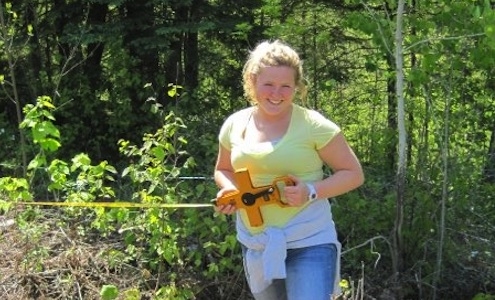
I'm interested in lots of things and am not yet sure what I want to do with my life? Given all the possible majors, why did you choose to pursue an Ecology, Evolution and Behavior major?
I began my undergraduate career as a biology major. I always knew that I enjoyed the larger scale aspects of biology even throughout my high school years, but I was not sure I wanted to deviate from the Biology degree I chose. While taking the Foundations of Biology course, I really noticed myself gravitating toward the new subjects of ecosystem ecology, animal behavior, and evolution. The following summer I took two field biology courses at the Itasca Biological Station, Animal Behavior and Ecology. This was my favorite summer experience of my college career. Upon returning for school in the fall, I changed my major to Ecology, Evolution and Behavior.
What was your favorite Ecology, Evolution and Behavior course? Why?
My favorite EEB course I have taken so far has been Ornithology (EEB 4134). I absolutely love birds and this class has greatly increased my knowledge of everything from the annual migrations of birds to the phylogenetics of bird species including helpful skills in field ornithology. We take field walks each week and I have noticed my field species identification has improved quite a bit and it has taught me a skill that I have found myself to be quite passionate about. We also learn about the different behaviors of the birds, which varies quite a bit among species as well as throughout the bird’s lifetime. David Attenborough clips are my favorite!
Once you graduate with an ecology, evolution and behavior major, what are you going to do with your degree?
Following graduation, I plan to take a year off and apply to medical school. During my year off I want to work in a research lab in the Health Sciences.
In what ways is an Ecology, Evolution and Behavior major is great preparation for a career in the health sciences?
An EEB major has been excellent preparation for me as I pursue a career in the health sciences. I have always thought that it combines my love for the outdoors, ecology and evolution with my interest in the health sciences. With an EEB major I can take a large variety of biology classes ranging from genetics to evolution to human physiology, which is of great help in applying to medical school. Evolution is becoming more and more of a focus in health careers due to the increased presence of drug resistant bacteria in our hospitals, so having knowledge of it will greatly benefit me. I am so happy that I could have a major like ecology, evolution and behavior that overlaps with my two major areas of interest.
Some colleges make a big deal about students doing research. Did you find it worth doing?
Absolutely. The U has so many advantages with its large size, among them is the opportunity to participate in directed research. I found that I learned laboratory skills that I would not have learned in any classroom.
If I decide to do research, how difficult is it to get involved in a research project and what do you actually get to do?
From my experience, getting involved in a research project just takes a little time and the willingness to learn. Students must feel comfortable in taking the first step to approach a professor about participating in research. Sometimes positions aren’t available but being persistent and continuing to contact professors will pay off and eventually a project will come through.
I understand that Ecology, Evolution and Behavior has professors who are leaders in their fields. But as a college student, would I actually get to interact with them?
As a student in the EEB department, I have always found it to be easy to approach a professor and interact with them. It can be something simple like staying after class to discuss a lecture topic or something more long-term like working in a research lab with the professor. The professors are always very receptive to their students, which makes it fun to talk to them!